Firebrand Ayatollah Tells Iranians Buying Dollars And Gold Is A Sin
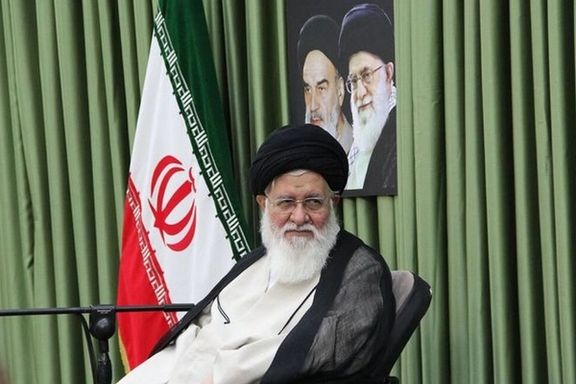
Amid high inflation and the declining value of Iran’s currency, an influential ayatollah says buying gold and foreign currencies as investment is a sin.

Amid high inflation and the declining value of Iran’s currency, an influential ayatollah says buying gold and foreign currencies as investment is a sin.
Ayatollah Ahmad Alamolhoda, father-in-law of President Ebrahim Raisi and Supreme Leader Ali Khamenei’s representative in the religious city of Mashhad, is known for his fundamentalist views, who is famous for banning cultural activities in the city.
Alamolhoda said in his Friday sermon April 21 that if people convert their capital to foreign currencies and gold it is sin “equal to hoarding and profiteering,” which is considered an offence according to Sharia.
Iran’s currency, the rial, has halved in value since mid-2022, with inflation above 50 percent and the middle class fast becoming impoverished. The US dollar has risen from 260,000 rials to around 520,000 since August.
People have been trying to invest in foreign currencies, gold and those with more resources in real estate to preserve their savings.
Alamolhoda also referred to women refusing to wear headscarves, which has angered religious hardliners. He said the Islamic Republic faces two big challenges: Economic crisis and a cultural crisis. He insisted however that these two problems are not related to one another.
Ordinary people who have been protesting against the regime, see the economic crisis as the result of government’s foreign policy and mismanagement and the enforcement of hijab as its undue interference in their private lives.
The regime that has refused to compromise over its nuclear program with the West, is determined to use repression to pacify the population.
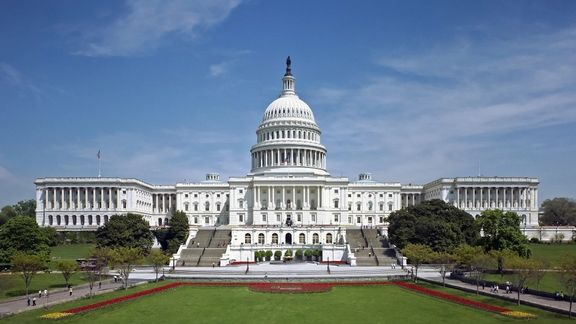
US lawmakers have moved to hold the Islamic Republic accountable over its crackdown on dissent and possible role in chemical attacks on girls’ schools across Iran.
A group of nearly 20 Republican and Democratic members of the US House has formed the Iranian Women Congressional Caucus, condemning the Iranian government over the recent poisoning of schoolgirls.
Amplifying the growing criticism in Washington against the Islamic Republic and its disregard for human rights, Rep. Sheila Jackson Lee (D-TX) and Rep. Nancy Mace (R-SC) -- who cochair the caucus – said Thursday that they are working on a resolution that condemns the Iranian government over the recent poisoning of schoolgirls.
The resolution, already backed by over a dozen lawmakers from both parties, calls on the State Department and the UN to investigate the attacks.
“So many Iranian women are showing their bravery and resiliency in the face of challenges in their fight for equality and human rights. We will be on the side of freedom and oppose the oppression of women, in the United States, Iran, and around the globe,” said founding co-chair Mace.
The caucus is the latest move by US lawmakers to denounce the treatment of women in Iran, especially since the death of 22-year-old Mahsa Amini in custody of hijab police in September 2022, which led to the boldest revolt against the clerical regime since its establishment in 1979.
More than 500 people have been killed in the nationwide rallies, nearly 20,000 have been detained, and several were executed on trumped up charges.
Moreover, a series of suspected chemical attacks at girls’ schools began in November and sending hundreds of schoolgirls to hospital, fueling claims about the violation of women’s and girls’ rights and prompting demonstrations in protest to the regime’s inaction and possible involvement.
In January, the House overwhelmingly approved a resolution expressing solidarity with the protesters. The 420-1 vote voiced support for the people in Iran who have been risking imprisonment and even death to protest against the country’s theocracy, which has engaged in a brutal crackdown of its citizenry.
Advocates and human rights groups have called on the US and other Western democracies to cut ties with the Islamic Republic and impose harsher sanctions on the top officials, including Supreme Leader Ali Khamenei and President Ebrahim Raisi.
The House Foreign Affairs Committee has finally scheduled the Mahsa Amini Human rights and Security Accountability Act -- or the MAHSA Act -- for a markup on April 26.
Late in January, House Armed Services Committee Member Rep. Jim Banks (R-IN) introduced the bipartisan MAHSA Act to sanction Iran’s ruler and his inner circle, saying “Regular Iranians like Mahsa Amini are being murdered and persecuted by the Iranian regime, but the Biden administration is still trying to cozy up to Iran’s senior officials so he can cut an even more disastrous nuclear deal.”
The markup session will be held by efforts of members of the Iranian-American community as well as more than 80 Democrat and Republican co-sponsors of the Act and Representative Michael McCaul (R-TX), the chairman of the committee.
The National Union for Democracy in Iran (NUFDI) announced in January that “NUFDI as a grassroots Iranian-American organization, is proud to support the re-introduction of the MAHSA Act in the 118th Congress,” urging “all members of Congress, regardless of their political affiliation, to support the MAHSA Act.”
Another advocacy group United Against a Nuclear Iran said, "The MAHSA Act provides a critical pillar in holding Iran's regime accountable for its crimes against the Iranian people and the international community. The supreme leader has evaded US counterterrorism and human rights abuse sanctions for years.”
However, some lobbyists and a few lawmakers try to dilute the act, describing it as “Islamophobic” or “not leading to any increased sanctions.”
NIAC, advocating non-confrontational policies toward the Islamic Republic, said in a statement that “the bill would make it more difficult for a President to lift sanctions on these officials as part of any diplomatic agreement... This bill does not include a sunset and would target the offices themselves, rather than individuals. As a result, it would remain in effect indefinitely and be applied to any future Supreme Leader or President of Iran until its repeal."
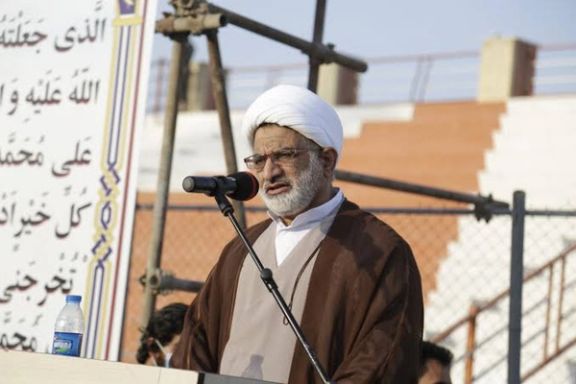
An Iranian official has said missiles will send the regime’s message to Israel, after exiled Prince Reza Pahlvi spoke of peace on his visit to the Jewish state.
Mahmoud Mahmoudi, a representative of the Supreme Leader and Friday prayer imam of the city of Kangan in Bushehr province, claimed that “the resistance groups opened the gates of hell to the Zionists with intense attacks and now they are surrounded by the resistance forces.”
Iran’s Islamic regime calls its proxy militias in the region “the resistance front”.
The contents of Friday Prayer sermons delivered by Khamenei's local representatives in various cities are dictated by two state bodies close to Khamenei's office, officially known as "The Policy-making Council for Friday Prayer Imams" and the "Friday Prayer Headquarters," both dominated by hardliner clerics.
Mahmoudi’s remarks came as leading opposition figure Pahlavi has just ended a historic tour of Israel, meeting with Israeli premier and president as well as several other officials with a message of peace between Iran and Israel after the collapse of the Islamic Republic.
During a press conference in Tel Aviv, Pahlavi talked about the prospects of peace and calm in the region when the Islamic Republic falls. “Imagine a different Iran, not ruled by a religious dictatorship, but [what] a secular democratic Iran could mean for our region, for stability and how it would impact the world positively,” he said.
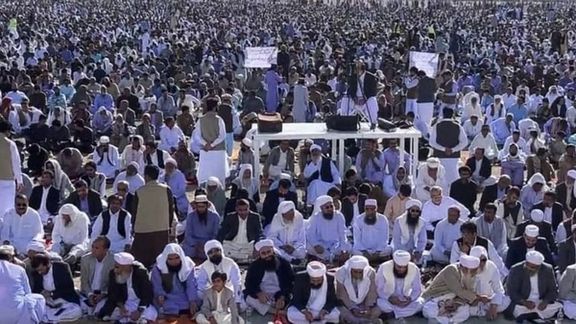
Iran’s leading Sunni has called for “big changes” and criticised the regime’s economic failures in a speech for Eid al-Fitr.
Mowlavi Abdolhamid was speaking on Friday, as Iran’s Sunni minority celebrated the holiday, despite Supreme Leader Khamenei decreeing that Eid is on Saturday.
Addressing the devaluation of the rial, he observed that even government officials and members of the armed forces are unhappy with the current situation, saying: "It seems that the government is unable to solve this problem.
"People are tired of this situation. There is a need for big changes in the country, and people will not achieve their wishes with minor changes."
Abdolhamid, the unofficial voice of the country’s Sunni community – about 10% of Iran’s population of 88 million – announced Friday as Eid al-Fitr, celebrated by Muslims worldwide as the end of the month-long dawn-to-sunset fasting of Ramadan.
In Iran, in the last days of the month of Ramadan, several groups of experts representing Khamenei go to the different zones of the country to determine the date of the festival.
Although he did not mention Khamenei by name, Abdolhamid appeared to criticize the Supreme Leader, saying that "Islam should not be harmed by the behavior of the officials."
While stressing the importance of "territorial integrity" and "national security", he said that "protests and free speech are people's right.”
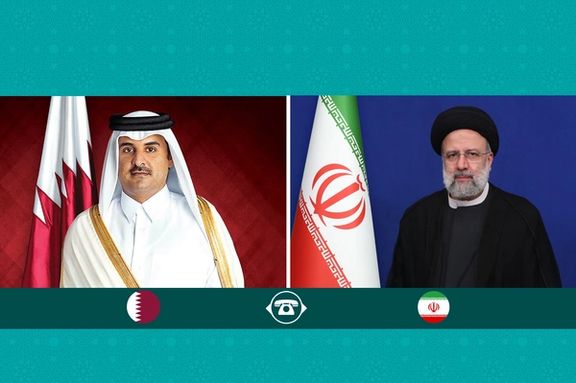
Iran continues outreach to regional Arab countries aimed at isolating Israel, as top Israeli officials are warning of a multi-front war orchestrated by Tehran.
President Ebrahim Raisi held a telephone conversation with the Emir of Qatar, Sheikh Tamim bin Hamad Al Thani Thursday and urged unity among Muslim countries against Israel and in defense of Palestinians.
Tasnim news website affiliated with the Revolutionary Guard claimed that the Emir also “harshly condemned Israel’s aggression.”
Iran’s diplomatic activism follows an agreement in March to normalize relations with Saudi Arabia, which has emboldened Tehran to use military and political levers to harm nascent ties between Jerusalem and Arab capitals.
The rapprochement with Saudi Arabia opens the door for the Iranian regime to explore deeper ties and influence with other Sunni Arab states, including the United Arab Emirates, Egypt, Jordan and others.
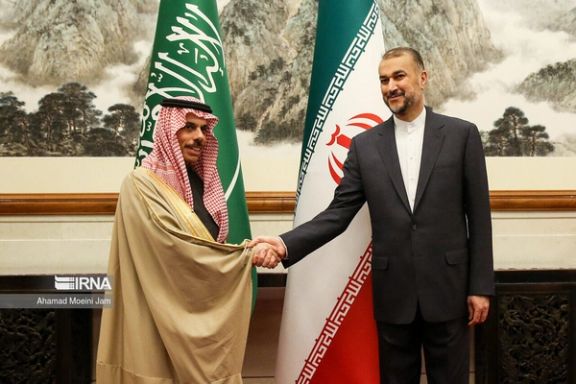
Mehr, another IRGC-affiliated website, reported a telephone conversation between Iranian foreign minister Hossein Amir-Abdollahian and his Jordanian counterpart Ayman Safadi Thursday evening.
Amir-Abdollahian praised Jordan’s “efforts in defending the Palestinians and their holy places in Quds” (Jerusalem). He also emphasized the importance of Islamic unity, saying “the Zionist regime is the biggest threat in the region.”
Israeli officials have been warning of a multi-front conflict with Iran’s proxies in the region, with attacks coming not only from Gaza but also Lebanon and Syria.
In the most recent round of violence, Palestinian groups under the protection of Hezbollah launched rocket attacks from Lebanon, as Iranian forces continue their plans to amass weapons and power in Syria.
Israeli Defense Minister Yoav Gallant warned Thursday that his country would likely see multi-front military escalation in the near future.
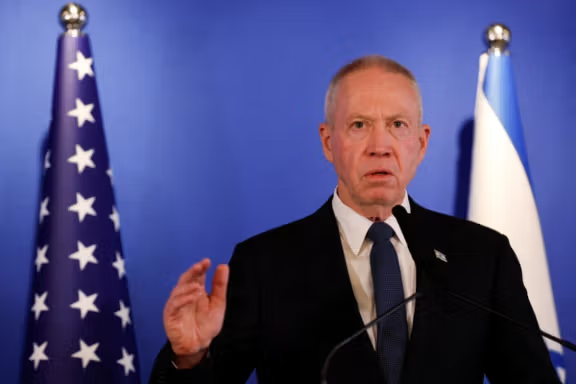
This is the end of the era of limited conflicts,” he told reporters. “We are facing a new security era in which there may be a real threat to all arenas at the same time.”
Gallant went on to say, “We operated for years under the assumption that limited conflicts could be managed, but that is a phenomenon that is disappearing. Today, there is a noticeable phenomenon of the convergence of the arenas.”
The defense minister directly accused Tehran of orchestrating the new strategy as “the driving force” which supports its proxy militant groups by transferring “resources, ideology, knowledge, and training.”
Former Israeli Prime Minister Naftali Bennett told Iran International this week that the Iranian regime spends tens of billions of dollars every year to support terror groups such as Hezbollah and Islamic Jihad instead of its own people, noting that such a substantial amount should be invested to improve the lives of Iranians.
Although Gallant’s estimate was a bit lower, but still it amounted to a few billions of dollars a year, including hundreds of millions to loyal Shiite militias in Iraq and Yemen.
Palestinian Islamic Jihad leader Ziyad Nakhaleh admitted recently that Iran has spent billions of dollars to prop up Palestinian militant groups in the past two decades. Tehran pays for every house destroyed in Gaza and transfers all the weapons needed, he added.
Iran’s overall military spending should also be considered as part of the threat Tehran poses to Israel., as it readily transfers troops to Syria, finances proxies in the war-torn country and develops a formidable drone and missile force.
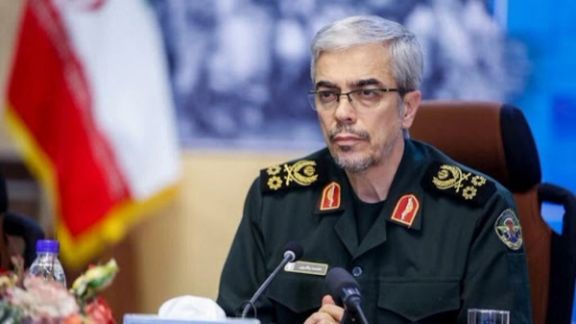
Iran’s most senior military commander says the US is afraid of the Revolutionary Guards, hailing the IRGC’s might and strategic capabilities.
Chief of Staff for the Armed Forces of the Islamic Republic Major General Mohammad Bagheri made the remarks in a congratulatory message on the occasion of the establishment of the IRGC, which is on Saturday.
“The IRGC's all-round strategic capabilities have not only brought about security and peace for the great nation of Iran and increased the deterrence power of the country, but have also caused fear and anger in the camp of various enemies of this land,” he said in a message addressed to IRGC’s commander-in-chief Hossein Salami.
In the jargon of the Islamic Republic, the main enemy refers to the United States, also dubbed as the great Satan, followed by Israel, and depending on the current state of affairs the word can extend to other Western countries.
Similar Iranian statements have increased recently as conflict flared up between Israel and militant groups supported by Tehran.
Bagheri’s remarks came a day after US Secretary of State Antony J. Blinken issued a statement, announcing sanctions on elements of Iran’s military procurement network. “These elements -- one individual and six entities -- based in Iran, China, and Malaysia have supported procurement activities of the US-sanctioned Iranian company Pardazan System Namad Arman (PASNA), which is linked to Iran’s Ministry of Defense and Armed Forces Logistics,” read the statement.
Stressing that Washington remains firmly committed to taking action to disrupt Iran’s military programs, the US said, “Iran’s proliferation of weapons destabilizes the Middle East and beyond, and we will continue to work with allies and partners to counter such activity.”